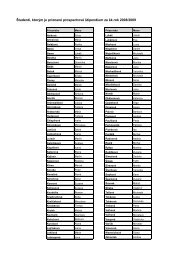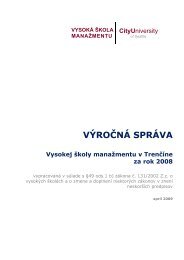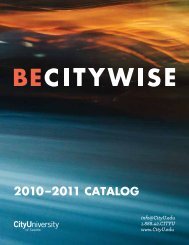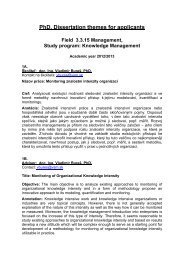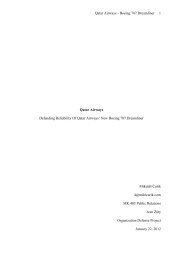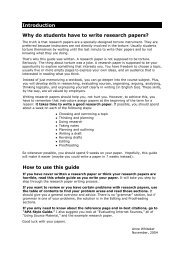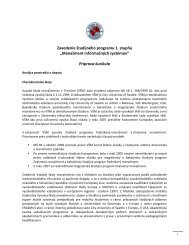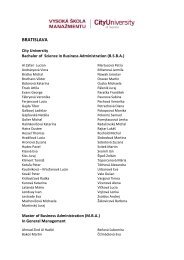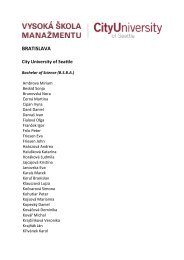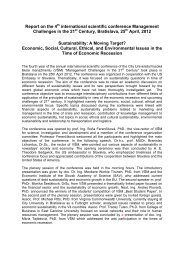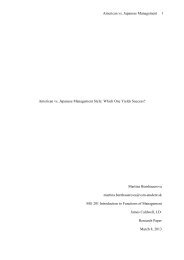VSM katalog 2008.qxd - Vysoká škola manažmentu
VSM katalog 2008.qxd - Vysoká škola manažmentu
VSM katalog 2008.qxd - Vysoká škola manažmentu
You also want an ePaper? Increase the reach of your titles
YUMPU automatically turns print PDFs into web optimized ePapers that Google loves.
SSC 220 Principles of MicroeconomicsThis course is an introduction of microeconomic theory with real world applications. Topicsinclude: How households, firms, and governments make decisions of what goods and servicesto produce, how to produce the goods and for whom to produce them. This course willhelp you apply the skills and tools learned from theory to current world events.SSC 221 Principles of MacroeconomicsThis course is an introduction of macroeconomic theory with real world applications. Topicsinclude: Inflation, unemployment, poverty, deficits, taxes, interest rates, gross domesticproduct, recession, and international trade. This course will help you apply the skills and toolslearned from theory to current world events.MTH 110 Introduction to StatisticsAn introduction to statistics for anyone who has difficulty with the way statistics is usuallypresented, or who is simply intimidated by the subject. It presumes no statistical backgroundand uses applications to explain statistical concepts without using mathematical symbols andequations. The applications range from sports, advertising, and politics to medicine and psychology.The course will not teach you how to produce statistics, but it will teach you howto understand them.SCI 215 Environmental ScienceThis course explores environmental change on a global scale, emphasizing the fundamentalconcepts of matter, energy, and ecology as applied to contemporary concerns. Environmentalissues impacting more than two dozen countries are illustrated in order to develop an internationalperspective on the environmental challenges facing our planet.AC 215 Fundamentals of AccountingAC 215 introduces basic accounting concepts and techniques; fundamentals of the accountingprocess and preparation of basic financial statements; accounting principles involved inthe measurement and reporting of assets and liabilities; elements of consolidated statementsand statement of cash flows; and using and interpreting financial statements for decisionmaking.CS 201 Information Technologies for ManagersThis course provides an introduction to the world of information technology, including theInternet, software and hardware, telecommunications, databases, and e-commerce. It examinesthe opportunities, challenges, and ethical questions brought by the digital age. As apreparatory course for the bachelor's degree programs in management, it develops students'skills in commonly used applications.MG 201 Introduction to Functions of ManagementIntroduction to planning, organizing, coordinating, staffing, directing, budgeting, controlling,and evaluating functions of management; leadership roles and styles, and developmentof individual and group effectiveness; managing conflict and change; and the human aspectsof management.BC 301 Critical ThinkingCritical Thinking introduces the student to critical thinking processes used to analyze today'sbusiness issues and aid the student in identifying rational solutions. The course focuseson building and analyzing arguments; forms and standards of critical thinking; and evaluatingsources of information. Students learn foundational skills that will serve themthroughout the program and their business careers.BC 302 Professional CommunicationProfessional Communication focuses on the fundamentals of communication in the workplace.Students build professional writing and speaking skills to inform, propose, and persuade.Students will also engage in analyzing a case study, developing PowerPoint slides, makingan oral presentation and writing e-mail messages, announcements, memos, letters, andreports. Students will learn how to identify an issue, conduct research, organize research findings,and present an argument. Additional topics include formatting business documentsand communicating with different audiences.BC 303 StatisticsStatistics focuses on the usefulness and limitations of statistical processes and their presentday applications. Topics include: descriptive statistics, probability theory and distributions,sampling, hypothesis testing, regression, and correlation models. Students will focus on problemformulation, technique selection and results interpretation. It is strongly recommendedthat College Math be taken prior to this course.BC 306 Ethics and LeadershipEthics and Leadership provides an overview of various philosophical approaches to ethicaldecision-making and practical applications involving ethical problems that arise in business.In addition, it introduces the student to the theory and practice of leadership. Topics includethe major ethical constructs, approaches to self-knowledge and practical leadership skills.Students will be able to find solutions to ethical dilemmas they may confront during a businesscareer, and have the self-knowledge and leadership skill to follow through with the solution.BSC 400 Decision Modeling AnalysisThis course is an examination of the analytical tools used to make optimal business decisions.Topics covered include: probability, decision analysis, and linear programming.Strongly recommended: MTH 155 - College Algebra and BC 303 - Interpreting Statisticsand Data.BSC 401 Interpretation of Financial StatementsInterpretation of Financial Statements focuses on the analysis of publicly issued financial statementsfor decision-making, and is taught from a user perspective. Students will learn to read,understand, and analyze a set of financial statements in a broad, decision-making context.Emphasis is placed on the consequences of recording accounting transactions on financialstatements and the application of Generally Accepted Accounting Principles(GAAP).3031



